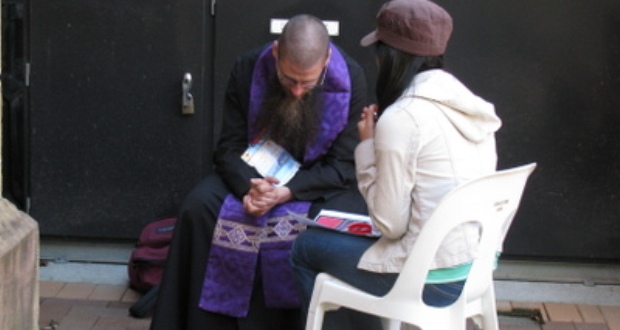The Sacrament of Reconciliation or Confession – God’s Gift To His Church

Before we get into confession and the importance of a good and regular confession, let us take a look at one of the questions that is hurled at Catholics very regularly. Why do Catholics confess their sins to a priest when they can go directly to God? Very often, at the heart of this question is another sin; a sin called pride. When we sin, regardless of how “private” we might think that sin is, it impacts on others around us. If you stop for a while and think about it, and you are honest with yourself, you will see that this is true. This is the case. Sin does have far reaching consequences and it’s impact is on more than those directly involved. With absolutely no intention of belittling recent events but sin is exactly like the earthquake that hit just out at sea, but the tsunami it caused impacts on lives hundreds of miles away.
Confession does not and cannot undo what has already been done; but a good confession can cleanse and heal the soul. The sacrament of reconciliation is one of the most beautiful and powerful “rivers of grace” that God has instituted for us His people who can come to this river when our hearts and souls are broken through sin, and leave the river with our hearts, our souls refreshed and renewed. This “river of grace” as I like to call it, was instituted by God Himself for in James 5: 15 – 16 says, “the prayer of faith will save the sick man and the Lord will raise him up again; and if he has committed any sin, he will be forgiven. So confess your sins to one another, and pray for one another, and this will cure you.” It is the Bible, the Word of God that says to “confess your sins to one another”. It does not say to confess straight to God or only to God but to one another. God is ALL WISE and there is none wiser than He is. No one understands us and sin like He does, and He knew that the best way to heal the effects of sin is through good and sincere confession.
The most compelling evidence of the fact that it was God Himself who instituted confession or the sacrament of reconciliation can be found in John 20: 19 – 23. Jesus had already completed what His Heavenly father had sent Him to do. He had already risen from the dead and is about to pass on to His disciples the continuation of the mission for which He had come.
In the evening of that same day, the first day of the week, the doors were closed in the room where the disciples were, for fear of the Jews. Jesus came and stood among them. He said to them, ‘Peace be with you,’ and, after saying this, he showed them his hands and his side. The disciples were filled with joy at seeing the Lord, and he said to them again, ‘Peace be with you. As the Father sent me, so am I sending you.’ After saying this he breathed on them and said: ‘Receive the Holy Spirit. If you forgive anyone’s sins, they are forgiven; if you retain anyone’s sins, they are retained.’
There are a number of things happening here:-
-
Jesus would not have told His disciples If you forgive anyone’s sins, they are forgiven; if you retain anyone’s sins, they are retained if He did not want people to confess their sins to them
-
This is the continuation of God’s love after Jesus had physically left the earth. This is the availability of Mercy after Jesus had left the earth – the “river of God’s grace”
-
Jesus is clearly passing His authority on to His disciples when He said to them, ‘As the Father sent me, so am I sending you.’
-
History will attest to the fact that this was the formation of the Catholic Church that is still alive and well today and will be around until the “end of time” because Jesus said that He will be with the Church until the end of time
Now all of us have sinned and will continue to sin and fall way short of the grace of God. But does that mean that we should continue to live in sin? Does that mean that I should not try to get out of sin? ABSOLUTELY NOT!! Yes we all are sinners but I by the grace of God, have chosen; I have decided to FOLLOW JESUS, and to turn away from sin; and so can you. The difference between a Saint and a sinner is that the saint gets back up every time he or she falls. The sinner chooses not to get back up and by so doing is forfeiting Eternal Life for eternal damnation. St. Paul put it very beautifully when he wrote:-
Someone who has died, of course, no longer has to answer for sin. But we believe that, if we died with Christ, then we shall live with him too. We know that Christ has been raised from the dead and will never die again. Death has no power over him any more. For by dying, he is dead to sin once and for all, and now the life that he lives is life with God. In the same way, you must see yourselves as being dead to sin but alive for God in Christ Jesus.
That is why you must not allow sin to reign over your mortal bodies and make you obey their desires; or give any parts of your bodies over to sin to be used as instruments of evil. Instead, give yourselves to God, as people brought to life from the dead, and give every part of your bodies to God to be instruments of uprightness; and then sin will no longer have any power over you — you are living not under law, but under grace.
Romans 6: 7 – 14
Some of the most beautiful experiences I have had in my journey of faith was in the wonderful sacrament of reconciliation or confession. Going in, feeling really rotten and bad about myself, and hearing the priest who represents the Catholic Church, and who has the authority handed down by Jesus Christ himself in John 20: 19 -23; to hear him say, “I absolve you of your sins in the Name of the Father and of the Son and of the Holy Spirit” floods my thirsting heart and soul with such joy and such peace that mere words cannot express. The sacrament of reconciliation or confession is a very powerful signs of God’s boundless love and mercy for us and it can truly liberate us and give us the grace to be better. Despite what the world tells us or how we might feel about ourselves, by the grace of God and through the Blood of Jesus, we can choose to say NO to sin and YES to God. We can choose to say YES to ETERNAL LIFE and NO to death. The sacrament of reconciliation – confession – makes this all possible. Please say NO to sin and choose ETERNAL LIFE.






One Comment